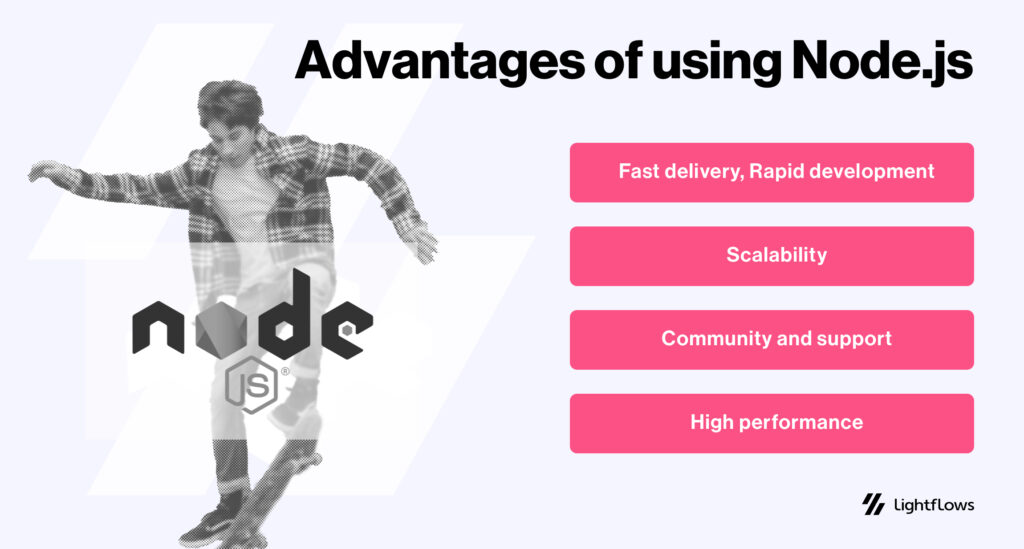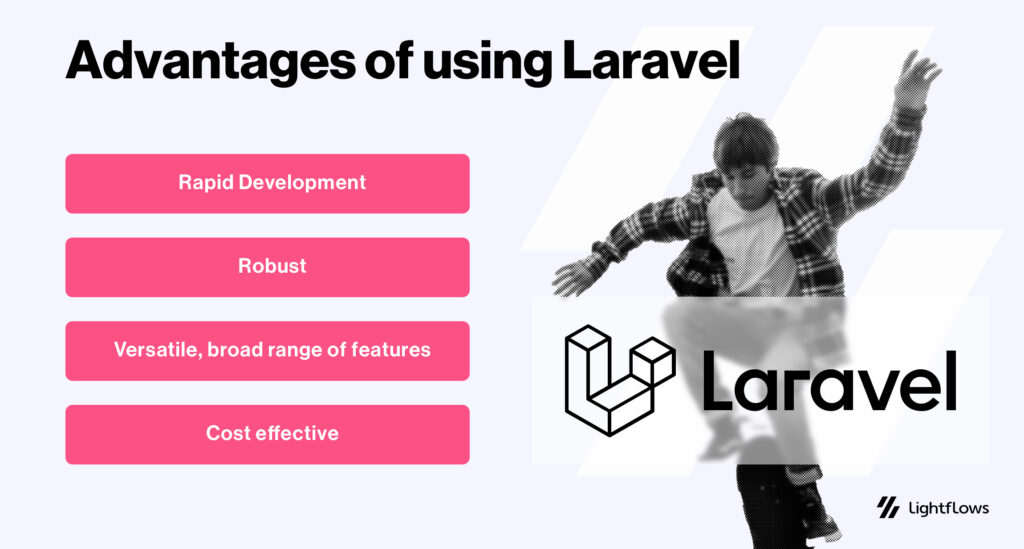Node.js, fundamentally a runtime environment, brings JavaScript to the server side, allowing for cross-platform development, efficiency and scalability. Meanwhile, Laravel, a PHP framework, offers a more structured approach to PHP development, with its built-in tools and templates, ease of integration and maintainable code. What does that mean for you? The choice between something like a quick-to-market real-time app or a structured, ultra-organised e-comm platform or CMS.
Node.js vs Laravel – Which of these two popular technologies would be best for your project in 2024 and beyond? When venturing into the world of backend technologies and picking one for your project, the choices can seem overwhelming. Among them, Node.js and Laravel stand out, especially among startups, for their unique capabilities and robust communities.
Both technologies have their own strengths and are suited to different types of projects and visions. Let’s dive into these technologies to find the right fit for your web application.
What is Node.js?
Node.js is a powerful runtime environment that has truly revolutionised how we think about web development since its introduction in 2009 by Ryan Dahl. It’s not a programming language itself but rather an engine that runs JavaScript, traditionally used in browsers, on the server side.
The key to Node.js’s popularity is its use of Google’s V8 JavaScript engine, enabling it to handle multiple tasks simultaneously and efficiently. This makes it ideal for real-time applications, where immediate data processing is crucial.
One of the standout features of Node.js is its ability to use JavaScript for both frontend and backend developments. Therefore, streamlining the entire development process. It also comes with npm (Node Package Manager), a vast repository of modules, which greatly aids in simplifying and accelerating development.
Node.js expanded JavaScript’s capabilities beyond the browser, making it a versatile tool for building efficient, scalable web applications. Big-name companies like Netflix, Uber, PayPal and even NASA rely on Node.js for various critical functions such as high-volume streaming and cloud data migration, which speaks volumes about its capabilities.
Pros and Cons of Node.js

Pros of Node.js
- Fast delivery: Node.js enables rapid development and deployment of applications, thanks to its non-blocking I/O model and the availability of numerous packages that speed up the development process.
- Scalability: It excels in handling large numbers of simultaneous connections, making it ideal for applications that expect high levels of traffic or require real-time data processing.
- Cross-platform support: Node.js applications can run on various operating systems (Windows, Linux, macOS) without significant modifications, for broader reach and easier deployment.
- Robust community: Node.js boasts a large and active community of developers. This community contributes to a vast ecosystem of modules and packages, provides extensive support and continuously drives innovation in the platform.
- Ease of adoption: For developers already familiar with JavaScript for front-end development, Node.js offers a lower learning curve and a smoother transition to backend development.
Cons of Node.js
- Heavy reliance on packages: Node.js often requires numerous third-party packages for extended functionality, which can lead to dependency management issues and security vulnerabilities.
- Performance with CPU-intensive tasks: Node.js is not as efficient in handling CPU-intensive tasks (like large calculations or image processing) due to its single-threaded nature, which can block the event loop and slow down performance.
- Comparatively less mature: Compared to other backend technologies like Laravel (PHP), Node.js is relatively less mature and less complete out of the box, which may affect stability and feature availability.
- Overhead in large applications: In larger, more complex applications, managing asynchronous code and callbacks in Node.js can lead to increased overhead and complexity in code management.
- Cost of development and maintenance: Due the popularity of Node.js, engineering costs can be higher.
When is it preferable to use Node.js?
Node.js has emerged as a powerhouse in the realm of backend development. It offers unique advantages that make it the go-to choice for certain types of applications. Its versatility extends from building real-time applications to server-side development, API creation and even orchestrating microservices architectures. Understanding when to leverage Node.js can significantly impact the efficiency and performance of your web application. Let’s dive into specific scenarios where Node.js stands out as the preferred tech.
Server-side development
Node.js excels in general server-side development due to several key characteristics:
- Handling concurrent requests: It can manage numerous concurrent connections efficiently, making it suitable for high-traffic web applications.
- JavaScript across the stack: Using JavaScript for both client-side and server-side development streamlines the development process and reduces the complexity involved in using different languages for the frontend and backend.
- Efficient use of V8 engine: Node.js leverages Google’s V8 JavaScript engine for fast code execution, enhancing performance.
- Long-polling approach: Node.js is capable of keeping connections open for a long time (long-polling), which is beneficial for real-time applications.
Real-time apps
Node.js is particularly adept at powering real-time applications. Its event-driven, non-blocking I/O model is ideal for applications that require immediate, bidirectional communication between the client and server. This makes it perfect for:
- Chat rooms: Node.js can handle multiple simultaneous connections with minimal performance overhead, crucial for chat applications.
- Online gaming: For multiplayer online games, Node.js facilitates real-time player interaction and data updates.
- Collaborative tools: Applications like online document editors and project management tools benefit from its ability to handle concurrent activities and updates.
API development
Node.js is also a strong contender for API development, especially when working with RESTful services, thanks to:
- Statelessness and uniformity: REST APIs built with Node.js are stateless and can uniformly handle requests, making them scalable and efficient.
- Flexibility in data exchange: It allows for easy handling of different data formats, such as JSON, which is commonly used in web services.
Microservices
In the realm of microservices architecture, Node.js offers significant advantages:
- Linking services: Its non-blocking, event-driven architecture makes it suitable for building and linking multiple microservices, allowing for a more modular and scalable application structure.
- Efficient service communication: Node.js facilitates efficient communication between different microservices, enhancing overall application performance.
What is Laravel?
Laravel is a web application framework – think of it as a toolset or a helping hand for building websites and web applications. It’s not a programming language itself, it’s more like a collection of tools and a set of rules to use PHP, a popular language for web development, more effectively.
It was created in 2011 by Taylor Otwell who wanted to make PHP development more structured, more efficient. It’s known for its elegant syntax, which means it’s easy to understand and comes with built-in features for common web tasks, saving developers time. One of Laravel’s best features is its MVC (Model, View, Controller) architecture. It’s a way of organising code that keeps the user interface separate from the logic and the data management. This makes the whole process of building and maintaining web applications a lot more manageable. It also comes with something called Artisan, a built-in “personal assistant” tool for automating repetitive programming tasks.
As it’s the ultimate organiser for web development, it’s used by a variety of companies across different industries, including Disney, Twitch and The New York Times, proving its versatility and reliability.
Laravel: pros and cons

Pros of Laravel
- Elegant syntax: Laravel’s syntax is clean and expressive, making code more readable and easier to maintain, which is a boon for developers at all skill levels.
- Robust features: It comes packed with features like routing, caching, authentication and session management, offering comprehensive tools needed for innovative web development.
- Rapid development: Laravel accelerates the development process with built-in templates and solutions for common tasks, significantly reducing development time.
- Task efficiency: With tools like Eloquent ORM for database operations and Artisan for command-line tasks, Laravel streamlines complex tasks, enhancing overall productivity.
- Versatile PHP framework: As a PHP framework, it leverages the wide adoption and reliability of PHP, making it a solid choice for a variety of web applications.
- Cost-effective: By reducing development time and effort, Laravel is a cost-effective solution for both small and large-scale projects.
Cons of Laravel
Learning curve: Newcomers to Laravel, especially those not familiar with modern PHP practices, might find it challenging to grasp all of its features and concepts initially. This is an individual consideration and doesn’t apply when hiring Laravel experts!
Performance considerations: For certain high-performance applications, Laravel might not be as fast as some other frameworks, particularly in scenarios involving complex or heavy data processing.
PHP limitations: Since Laravel is built on PHP, it inherits the limitations of PHP, including issues related to large-scale, high-speed computing tasks.
Heavyweight framework: Laravel’s robustness comes with a trade off in terms of weight; it’s a heavier framework compared to some others, which might not be ideal for very simple or micro projects.
Upgrades and backward compatibility: Upgrading to newer versions of Laravel can sometimes be challenging due to changes in the framework, impacting backward compatibility.
Overreliance on third-party packages: While Laravel’s extensive ecosystem is generally an advantage, like Node.js, but less so, its reliance on numerous packages can sometimes lead to dependency issues and potential security vulnerabilities.
When is it preferable to use Laravel?
Selecting the right framework is key to your project’s success. Laravel excels in various web apps with its elegant syntax, rich features, and scalability. Its comprehensive nature makes it particularly well suited for specific types of applications and development needs, like a sophisticated e-commerce platform or a custom CMS. Let’s see why Laravel excels and could be perfect for your next web project.
Full-stack web applications
Laravel’s comprehensive range of built-in functionalities makes it an ideal choice for developing full-stack web apps efficiently and effectively.
- Integrated systems: Laravel is perfect for building full-stack applications, offering seamless integration of frontend and backend systems.
- Robust tools: Features like Eloquent ORM for database interactions, Blade templating for views and built-in authentication systems provide a complete toolkit for developers.
RESTful APIs
Laravel is exceptionally useful for developing efficient and secure RESTful APIs, thanks to:
- API development tools: Laravel offers simple yet powerful routing, request handling and secure integration tools like Sanctum and Passport.
- Seamless data exchange: It simplifies the development of APIs that need to communicate efficiently with various clients.
Content Management Systems (CMS)
Laravel’s structured MVC architecture and robust set of features streamline the development of custom CMS platforms, enhancing organisation.
- Custom CMS development: MVC architecture aids in developing custom CMS platforms, allowing for efficient management of content.
- Flexibility and scalability: Laravel’s scalability makes it suitable for CMSs of varying sizes and complexities.
E-commerce platforms
Laravel’s a great choice for eCommerce – as a standalone platform, or management system. See our case study on managing multiple Shopify stores with Laravel.
- Feature-rich: It’s ideal for e-commerce sites due to its robust features like user authentication, payment processing and complex data handling.
- Tailored packages: Laravel provides essential security features and scalability, supported by packages tailored for e-commerce, like Laravel Shopping Cart and Aimeos.
Cloud-based applications
Laravel’s robust integration with cloud services and its proficiency in managing background tasks make it ideal for developing cloud-based applications.
- Cloud compatibility: It works well with cloud services and storage systems, a crucial aspect of modern web applications.
- Background processing: It shines in handling queued jobs and background tasks, vital for cloud applications’ performance and scalability.
Real-time applications
Laravel is highly effective for real-time applications, offering advanced features for interactive and immediate user experiences.
- Interactive features: It’s great for building applications with features such as live chats or instant updates.
- Real-time tools: Laravel offers tools like event broadcasting and Laravel Echo for efficient real-time communication.
Rapid application development (RAD)
An array of tools and resources make Laravel a powerhouse for RAD, catering to diverse project needs.
- Speedy development process: With built-in tools and a vast ecosystem (including Jetstream, Forge and Vapor), Laravel accelerates the development cycle.
- Versatility: It’s adaptable to a wide range of projects, from small-scale applications to large, complex systems.
Microservices architecture
Laravel stands out with its capability to efficiently manage and link various services and databases.
- Microservices friendly: It’s capable of efficiently building and managing microservices architecture.
- Database and queue system interaction: Laravel effectively interacts with various databases and queue systems, crucial for microservices’ performance.
Wrapping up
Ultimately, picking Node.js or Laravel depends on your project goals and team preferences. Node.js is known for fast, scalable performance, ideal for real-time functionality and growth. On the other hand, Laravel provides a structured, feature-rich setting, ideal for complex web applications. Both platforms are supported by strong communities and comprehensive guidance, ensuring you have the resources needed for success. Your best choice matches your project’s needs, team skills, and future goals. With a deep level of experience in both technologies, Lightflows are on-hand to advise you.
Key takeaways
- Node.js is optimal for real-time, scalable applications requiring quick development cycles and efficient data processing.
- Laravel excels in creating complex, feature-rich web applications with its elegant syntax and robust built-in tools for a more structured development approach.
- Choosing between Node.js and Laravel depends on needs: Node.js for speed and real-time, Laravel for complex features.
- Both technologies have vibrant communities and extensive ecosystems, ensuring support and resources for building sophisticated web applications.
Ready to get started? Book a chat with us.
FAQ’S
Node.js is hugely popular among developers for building scalable and efficient web applications, especially where real-time data is crucial. Thanks to its JavaScript base, it’s a top choice for many modern web projects. Laravel has gained significant popularity in the PHP community for web development. Its ease of use, elegant syntax and robust features make it a favourite among PHP developers.
Node.js excels at real-time data and concurrent connections, perfect for fast-update apps. Its non-blocking architecture ensures efficient processing. Laravel provides balanced performance across many web apps, despite being slower than Node.js for some tasks. Its structure and built-in features allow for rapid development without sacrificing quality.
Node.js alternatives are: Django for robustness, Ruby on Rails for simplicity, and ASP.NET for Microsoft users. Alternatives to Laravel are Symfony for PHP flexibility, Ruby on Rails for Ruby users, and Django for Python web development
Table of contents



